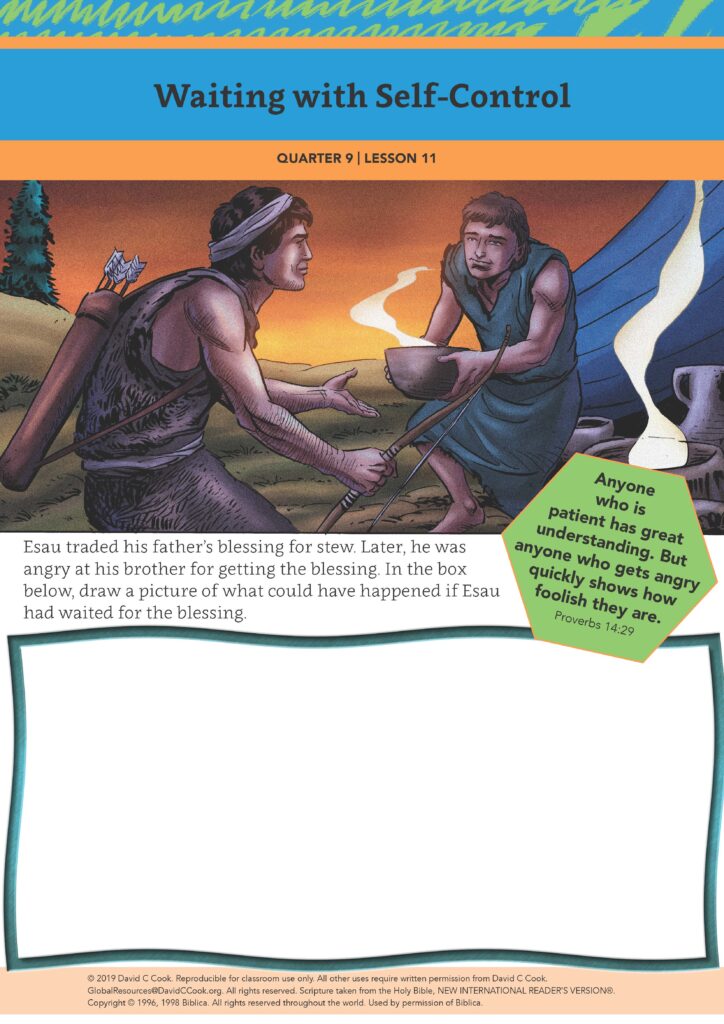During the lesson, the information for you to know is written in regular type, and what we suggest speaking or reading aloud to children is in bold. All resources for this lesson, including the Teacher Guide, Student Page, Family Connection Card, and other resources can be downloaded in a ZIP file by clicking on the following link:
In some lessons you will find "resource articles." These are articles written by experts from around the world to help equip you for your work with children and adolescents. Share them with parents or guardians if you consider it appropriate.
You will need a large, clear area to play the game in the Connecting section. You may play outside or clear a space in your teaching area before class begins. If you do not have a large area, use the optional game instead.
Getting excited about something without knowledge isn’t good. It’s even worse to be in a hurry and miss the way.
Proverbs 19:2
Excitement and impatience are powerful emotions. We often see the way we want to go, and we rush toward it, forgetting to think, pray, and ask for God’s guidance. When we act without thinking and rush into things, we can miss the better plan God has laid before us. God calls us to learn patience and wisdom and to deepen our faith in Him. When we do this, we become more like the people He created us to be.
In what areas of your life are you excitedly or impatiently pushing forward without looking to God for guidance? Instead of rushing to act, practice patience. Get advice from people you trust. Pause and reflect on the immediate and long-term consequences of your decision. Think before you act, and ask God to guide your steps. Then listen patiently for His answer. You will only realize God’s best for your life when you learn to wait on Him.
Ask the families to share with their children some of the good things they have waited for in their lives. This will help to reinforce the value of waiting with self-control.
Teacher Tip: If possible, email or text the Family Connection Card to the families of your students.
Greet the children. Tell them you will play a fun game to start class.
Have the children line up side by side on 1 end of your large, clear area. Stand at the other end of the area, facing the children.
Let’s start with a game. When I say, “Go!” you will walk as quickly as you can toward me. But when I say, “Stop!” you must stop right away. If you even take 1 more step, you will need to go back to where you started the game. The first person to reach me wins the game!
Begin the game by saying, “Go!” Then a second or so later, say, “Stop!” Continue to do this until 1 of the children reaches you. Try to vary the amount of time between the commands so the children will listen carefully to them. If a child continues to walk after you say, “Stop!” gently tell him he must return to the place where he started and continue playing from there.
Optional: If you do not have a large area, play the game in a similar way but have the children clap or sing when you say, “Go!” instead of walking. They must stop clapping or singing when you say, “Stop!” If a child does not stop in time, he is out of the game.
Congratulate the winner. Then have all of the children sit down in a circle for the lesson. Sit in the circle with them.
Today we will learn more about self-control and how waiting can help us practice self-control. The Bible tells a true story about 2 brothers. In the story, 1 brother was good at waiting while the other was not.
A long time ago, there were twin brothers. Their names were Jacob and Esau. Even before they were born, Jacob and Esau struggled with each other. Esau was born first, but Jacob was born right after Esau, and he was holding on to Esau’s foot. As the boys grew, they continued to disagree. Their father loved Esau the most, but their mother loved Jacob the most. Listen to what happened one day:
Read these verses directly from your Bible.
One day Jacob was cooking some stew. Esau came in from the open country. He was very hungry. He said to Jacob, “Quick! I’m very hungry! Let me have some of that red stew!” That’s why he was also named Edom.
Genesis 25:29–30
Say what Esau said with me.
Lead the children in saying, “I am very hungry! Let me have some of that red stew!”
Jacob said to his hungry brother, Esau: “First sell me the rights that belong to you as the oldest son of the family.” As the oldest son, Esau would receive all of his father’s land and everything that belonged to him. That is a lot of good things to trade for a bowl of stew!
Optional: If possible, show the image from The Action Bible.

Do you think Esau made the trade? Why or why not?
Allow 2–3 children to respond. After the children have shared their ideas, repeat all of the answers 1 at a time and ask the students to raise their hands to indicate which answer they think is correct.
Read the next part of the story directly from your Bible.
“Look, I’m dying of hunger,” Esau said. “What good are those rights to me?” But Jacob said, “First promise to sell me your rights.” So Esau promised to do it. He sold Jacob all the rights that belonged to him as the oldest son. Then Jacob gave Esau some bread and some lentil stew. Esau ate and drank. Then he got up and left. So Esau didn’t value the rights that belonged to him as the oldest son.
Genesis 25:32–34
Did Esau choose self-control? Why or why not?
Allow 2–3 children to respond.
Let’s all pretend we are eating some very good stew.
Do you think this stew is delicious enough to trade something important for it?
Have the children indicate “yes” or “no” without speaking. For example, they may nod their heads “yes” or “no.” Then get their attention and share the next part of the story.
Esau did not show self-control. He only worried about how hungry he was at that moment. He did not care that he gave away the wonderful gift his father would give him because that was not happening yet.
Have you ever made a choice that helped you at the time but did not help you later? For example, maybe you chose to take your sister’s special coat. At the time, the coat would keep you warm. If you lost the coat, your sister might be angry with you, or she might be sad because she does not have a coat. Then you would have to restore your relationship with your sister.
A few years later, Jacob went to his father pretending to be Esau. The boys’ father blessed Jacob instead of Esau. This was a very important blessing because it came from God. When Esau learned his father had given his blessing to Jacob, Esau was very angry and wanted to kill his brother.
Optional: If you are using The Action Bible, allow the children to review the story of the stolen blessing on pages 72–74.
Did Esau show self-control when he learned Jacob had received the blessing?
No.
Why do you think Esau was angry at his brother?
Allow 2–3 children to respond.
Jacob had taken something very important that Esau thought belonged to him. Knowing Esau might kill Jacob, their mother sent Jacob far away. He got married and had children. Many years later, God sent Jacob back to his homeland, and Jacob decided it was time to restore his relationship with Esau. So Jacob and his family met with Esau.
Read this verse aloud from your Bible.
Esau ran to meet Jacob. He hugged him and threw his arms around his neck. He kissed him, and they cried for joy.
Genesis 33:4
Do you think Jacob and Esau showed self-control in the way they spoke with each other? Why or why not?
Allow 2–3 children to respond.
The brothers were not angry. Instead they were very happy. The brothers then left each other in peace.
This story would probably have been much different if both Esau and Jacob had waited with self-control. This can be true for our lives as well. Sometimes we are impatient, and we want things to happen right now. But when we do not wait with self-control, sometimes we may not get something very good because we cannot wait for it. Or we may cause problems with people we care about. Listen to what the Bible says about waiting:
Anyone who is patient has great understanding. But anyone who gets angry quickly shows how foolish they are.
Proverbs 14:29
God has good things planned for each one of us. Sometimes that means we need to wait with self-control. Even when we know that waiting is a good thing, waiting can be very difficult! Here are some ideas to help you to wait with self-control:
Think about which of these ideas might help you to wait with self-control. When I name an idea you would like to try, raise your hand.
Have the children raise their hands when you say the idea they would like to try.
Instead of practicing what we learned today, let’s just sit here and wait for class to end. Ready? Let’s wait quietly without doing anything at all.
Pause for about 30 seconds or until the children begin shifting in their places or making noise.
This is really boring! Let’s play a game while we wait for class to end!
To win our game, you will have to complete 3 tasks. You can do them in any order, but you must complete all 3 tasks. You must:
Show the children a brief example of all 3 tasks to help them remember what to do. Encourage the children to do this with you.
Once you have finished doing all the tasks, sit in your regular place. I will be walking around our space to listen and watch what you are doing, so please only sit when you have completed all 3 tasks.
Give the children 5–10 minutes to play the game. Announce the winner, then ask the remaining children to continue playing until everyone has completed the 3 tasks.
Optional: If you are using the Student Pages, give the children crayons and allow 2–3 minutes for them to complete the activity on their pages.

It was so much easier to wait when we had something else to do! When you must wait for something, you can do something fun, talk about your excitement, do the difficult task first, or pray. This will help you wait with self-control.
We can ask God to help us to wait with self-control, just like we can ask Him to help us to choose self-control in our actions and our words. Let’s review our memory verse, which tells us that God helps us with self-control.
Read the verse from your Bible.
God gave us his Spirit. And the Spirit doesn’t make us weak and fearful. Instead, the Spirit gives us power and love. He helps us control ourselves.
2 Timothy 1:7

Repeat the verse and motions with the children 3 times. End class by saying this blessing, based on Proverbs 19:2, over the children.
Blessing: May you celebrate with excitement all the wonderful things God is doing in your life, and may you learn to wait with self-control so you can always see His way for your life.
Lead the children in singing this quarter’s song, if possible.
Life on Life ©2020 David C Cook. Reproducible for home or classroom use only. All other uses require written permission from David C Cook [email protected]. All rights reserved.